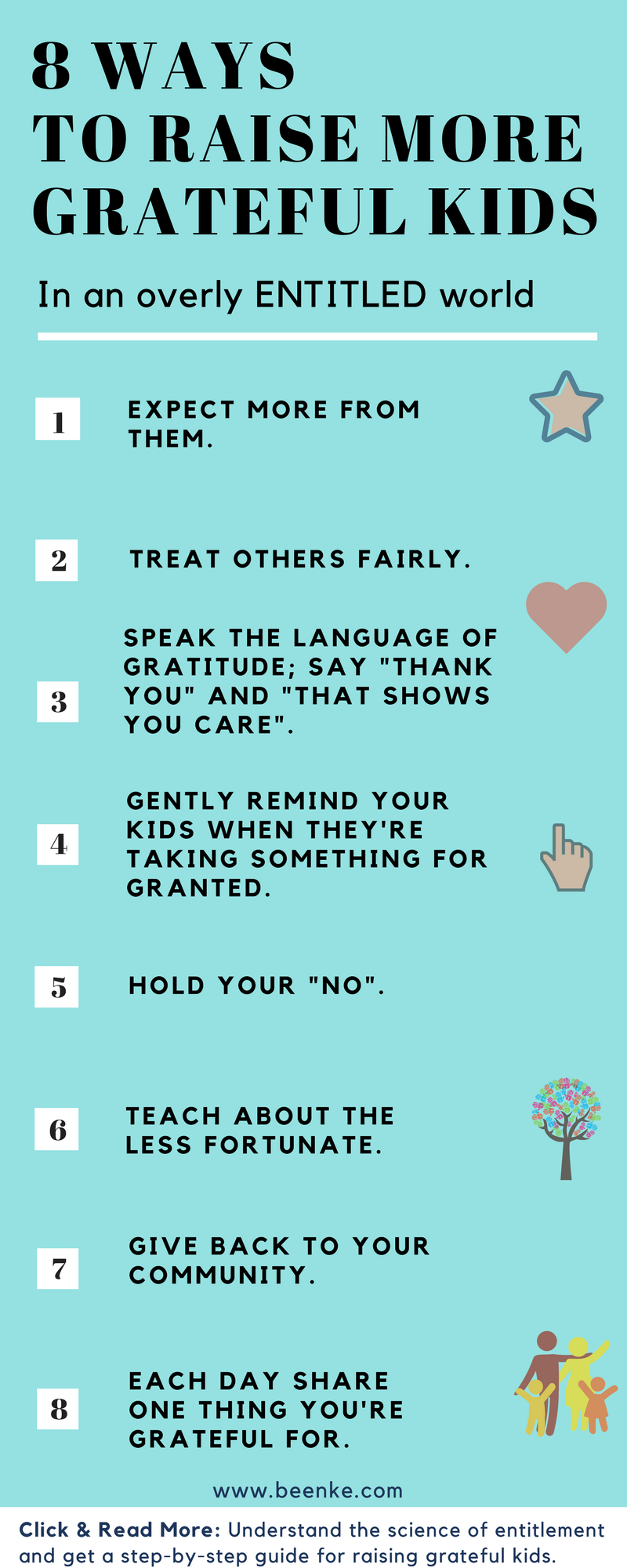If you’re wondering how to raise grateful children in this modern consumer world, you’re not alone.
You’ve probably seen examples of it all around you. The phenomenon where certain kids think the universe revolves around them. Some people call it the “Me Epidemic”, and it isn’t cute.
While “me-me-me” kids are hard enough to deal with now, imagine when they grow up to become demanding, high-maintenance adults that aren’t equipped to handle life when things don’t go their way.
None of us wants that for our children.
So, back to our question…how to raise grateful children in a society where there’s an attitude of entitlement? There’s not one simple answer.
Gratitude and appreciation aren’t taught in a single lesson. Rather they are learned, over time, by teaching kids gratitude in daily moments.
The good news is that gratitude for kids can be taught!
All it takes is a few simple changes in parenting to lead our children away from entitlement and towards appreciation.
How To Raise Grateful Children
Practice Gratitude In Your Own Life
First, let’s do a quick reality check.
We can point fingers and try to blame television, social media, or other outside influences, but one of the biggest factors in the spread of the “me epidemic” is us.
Most children are mini versions of their parents. It can be an uncomfortable process, but if you want to know how to raise grateful children – start by doing a reality check of your own life.
It can be an eye-opening experience.
Ask yourself these questions:
Am I spoiling my child?Do I think my child deserves preferential treatment over other kids?Do I feel entitled to certain things in my own life?
Be honest with yourself. And it’s okay if you answered yes to one, or all of these questions.
You want to get a baseline of where you’re starting, so you know what to work on.

Learn The Science Of Entitlement
There is a relatively new field of research called behavioral economics that explores the sometimes irrational ways people make decisions and view the world.
Understanding how these thought patterns work can help us raise kinder, less entitled kids.
Here are three important behavioral concepts to understand along with ways you can use them. Keep these in mind while considering how to raise grateful children.
1. The Fundamental Attribution Error:
How You Can Use This:
2. Hedonic Adaptation:
How You Can Use This:
3. The Identifiable Victim Effect:
How You Can Use This:
8 Ways To Raise Grateful Kids
“We tend to forget that happiness doesn’t come as a result of getting something we don’t have, but rather of recognizing and appreciating what we do have.” – Frederick Keonig
1. Expect More From Your Kids
Give your kids a little credit. They are perfectly capable of doing things for themselves and your family.
Research indicates that people are actually more motivated to do things as part of a social transaction than a financial one.
Frame chores as needed contributions that matter to the family. Not a job they have to do to get paid, which implies they can quit at anytime.
RELATED: Why Chores Help Kids More Than You Know
If you hold your kids to a higher standard and expect them to handle their family responsibilities, they will often meet or exceed your expectations.
Your kids feel good, and you’re doing your part to raise helpful human beings.
2. Treat Others Fairly
If you’ve been guilty of treating your child as though they are above other kids, it might be time for a change.
Kids will internalize an entitled attitude and think they deserve preferential treatment all the time.
Be fair to everyone you interact with. Don’t put your child ahead of anyone else.
If you treat people equally, your child will learn other people matter as much as they do.
3. Speak The Language Of Gratitude
It seems so simple, but sometimes we forget.
When your kids do something kind or helpful, say “thank you” to them.
Children learn to appreciate others by being appreciated.
Thank them for clearing the table, or taking out the trash. Also be sure they hear you thanking the people around you.
Thank your partner for making dinner, thank your neighbor for getting your mail.
Kids learn by watching. When they see you being thankful, they will be too.
In addition, try adding an empathy phrase to your thank you’s to show your kids that you recognize they’re being thoughtful and caring.
Say things like “that shows you care” or “that shows how considerate you are” when they do something helpful.
They will begin to make the connection between their actions and gratitude.
4. Call Them Out When They’re Being Entitled
This doesn’t mean you should shame your kids, or give them a lecture on how ungrateful they are.
Gently remind them when they’re taking something for granted.
For example, if they’re complaining about the dinner you just cooked, your response could be something like, “I think you meant to say thank you for taking the time to cook for me”.
Make them stop and think about the effort that goes into something before rolling their eyes or complaining.
RELATED: How To Stop Kids From Whining

5. Hold Your No
Do you ever find yourself saying YES when you want to say NO in order to appease your whining child?
Now is the time to stop giving in to their demands. We often overindulge our kids in order to avoid disappointment, but here’s a newsflash…
Your kids don’t need to get everything that they want.
Just let that sink in for a minute. By saying “no” and sticking to it you’re teaching your kids that life won’t always go their way, and that’s OKAY.
You are establishing healthy boundaries.
6. Teach About The Less Fortunate
Give your kids some perspective. Educate them about how other children live both around the world and in your own area.
Let them see the struggles of others so they appreciate they things they have.
“We need to uncenter our children’s universe and get them to think outside themselves. When they do this, children begin to see it’s not all about them.” –Amy McCready, author of “The Me, Me, Me, Epidemic: A Step-by-Step Guide To Raising Capable, Grateful Kids in an Over-Entitled World”
7. Give Back
Create opportunities for your child to give back to others that are in need.
Establish “do good” days in your house where you actively help other people in your neighborhood.
Have kids donate their toys to a family in need when they outgrow them.
RELATED: Random Acts Of Kindness For Kids: 30 Day Challenge
Get the kids involved in charity work, keeping the “identifiable victim effect” in mind.
Choose ways to give back where your kids can “see” the people they are helping, which makes it more meaningful.
Go to a shelter to serve food, adopt a family for Christmas…seeing the individuals being helped makes gratitude real for kids.
8. Establish A Daily Gratitude Practice
Encourage your kids to find things they are thankful for, every day.
Make gratitude activities a part of your nightly dinnertime or bedtime routine.
Older kids can even keep a gratitude journal if that works for them. You want to make it a regular practice to notice the little things we often take for granted.
RELATED: Amazing Benefits Of Teaching Mindfulness To Children
The research is clear; people who approach life with an attitude of gratitude are happier, less stressed, and more resilient.
Gratitude is the antidote to entitlement. Follow these steps for how to raise grateful children, and watch them grow into caring adults you can be proud of.

SHARE how to raise grateful children with friends on Facebook and Pinterest by clicking the buttons below.












